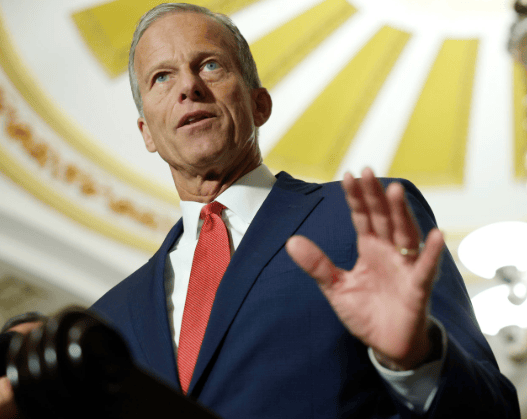Republican congressional leaders are firmly rejecting President Donald Trump’s demand to eliminate the Senate filibuster, despite mounting pressure as the federal government shutdown extends past 31 days.
Senate Majority Leader John Thune made clear this week that he will not support altering Senate rules to pass legislation with a simple majority — a move Trump has urged in a bid to break the deadlock in Washington.
A spokesperson for Thune reaffirmed his longstanding defense of the filibuster, saying his position “is unchanged,” signaling to both the White House and the GOP base that institutional norms will hold.
This sharp response marks one of the clearest divides yet between Republican leadership on Capitol Hill and Trump, whose influence over the party remains strong but not absolute when it comes to fundamental Senate rules and power structures.
Why GOP Leaders Won’t “Nuke” the Filibuster
The Senate filibuster requires 60 votes to advance most bills, giving the minority party — currently Democrats — the ability to block legislation. Trump argues its removal is necessary to force progress and break the gridlock. GOP leadership, however, views the rule as a critical institutional safeguard.
Speaker Mike Johnson, typically aligned closely with Trump, warned that ending the filibuster could backfire on Republicans when Democrats return to power.
He cautioned that without the filibuster, Democrats could move quickly to expand the Supreme Court, grant statehood to Puerto Rico and Washington, D.C., and push through sweeping gun control legislation.
Johnson emphasized that Trump’s late-night call to abolish the rule reflected his frustration with the shutdown, but maintained that preserving the filibuster remains essential for the balance of power.
Senate Republicans Hold Firm
Eliminating the filibuster would require near-unanimous GOP support in the Senate — a scenario far from likely. More than a dozen Republican senators have publicly opposed any move to dismantle it.
Utah Sen. John Curtis restated his position:
“Power changes hands, but principles shouldn’t. I’m a firm no on eliminating it.”
Sen. Roger Marshall echoed that sentiment, calling the idea a “non-starter” and stressing that the rule protects minority rights and prevents policy from shifting drastically with each change in majority control.
Behind the scenes, GOP aides say Thune’s swift dismissal of Trump’s demand eased internal pressure, providing political cover to senators who support maintaining Senate norms.
“No one in the conference seriously wants to nuke the filibuster except maybe two,” one senior Republican staffer noted.
Shutdown Politics and Party Identity
The shutdown continues to disrupt federal agencies, slow benefits and services, and create rising anxiety among Americans. Still, Senate Republicans remain committed to preserving the filibuster, even as critics argue it is contributing to legislative paralysis.
Thune has previously called the rule “a bulwark against a lot of really bad things happening,” and continues to position it as a structural guardrail essential to U.S. governance.
The debate underscores a deeper struggle within the Republican Party — between Trump-driven pressure to aggressively rewrite institutions and the Senate GOP’s longstanding preference for procedural stability and incremental policymaking.
Outlook
Republican leadership is signaling that institutional norms outweigh short-term political gain. While Trump’s influence remains strong, Senate leaders appear determined to preserve the filibuster — even under intense partisan pressure and amid a prolonged shutdown.
The standoff sets the stage for continued internal GOP tension as the shutdown continues and the party weighs its future identity: traditional conservative governance versus Trump-aligned populist disruption.
Key Takeaways
Republican leaders rejected Trump’s demand to eliminate the Senate filibuster during the shutdown.
GOP officials warn Democrats would weaponize the rule change to advance sweeping progressive policies.
More than a dozen Republican senators remain firmly opposed to ending the filibuster, making a rule change extremely unlikely.
The shutdown continues with no procedural changes expected, despite rising national pressure to resolve the impasse.
This moment highlights internal Republican tension between traditional Senate conservatives and Trump’s populist approach.

